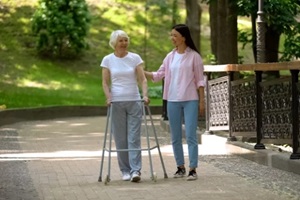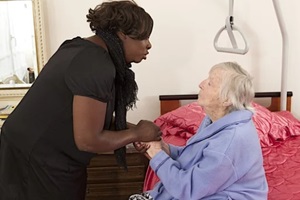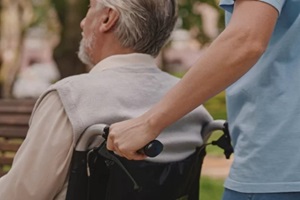 Families often look forward to being able to care for their older loved ones in their own homes. After all, having your parent, sibling, or grandparent around for family dinners and holidays seems like an exciting option. However, many people quickly realize that the burden of caregiving is not something they were prepared for, as it takes an emotional and physical toll on them.
Families often look forward to being able to care for their older loved ones in their own homes. After all, having your parent, sibling, or grandparent around for family dinners and holidays seems like an exciting option. However, many people quickly realize that the burden of caregiving is not something they were prepared for, as it takes an emotional and physical toll on them.
In addition, most families do not know that options such as dementia caregiver support groups and other resources are available to help mitigate this challenge. Continuing to include your older family members in your life can be a blessing, but it should be approached with care.
Here is some helpful guidance for caregivers to manage stress, seek support, and maintain their health while caring for their loved ones.
The Emotional Challenges of Caregiving
Seeing a loved one age and experience the natural decline that comes with their later years can be an emotional challenge for anyone. Add to this the difficulties of dementia, Alzheimer’s, mobility limitations, and illness, and caregiving can quickly lead to emotional burnout.
You are not broken, cruel, or uncaring for feeling the difficulty during this time. It is easy to harbor resentment, guilt, and insecurity when you realize caregiving is a monumental task for which you may not feel fully equipped.
Remaining patient with a struggling family member, sacrificing your personal time and goals, and feeling like you never have a chance to rest can all contribute to the emotional side of caregiver burnout.
A Caregiver’s Physical Needs
Emotions are not the only fraught area when caring for an aging loved one. Burnout can happen on a mental and physical level, and for many families, the physical demands of caregiving are more than they can handle.
An elderly family member may need interventions as significant as being transferred from a bed to a chair. Without proper equipment, this can pose a real risk of injury for untrained family members.
Even minor tasks can wear down a person physically. Being in charge of bathing, extra chores, and additional errands for the older family member all require energy, leaving you feeling sapped and drained.
If your loved one needs help throughout the night, you might not be getting the sleep you need, either. Physical burnout is just as significant as the emotional toll of providing care.
Resources and Support for Caregivers
 No matter what care you provide for your loved one, you do not have to do it alone. One of the most important things any family member can do for their aging parent is invest in support for themselves.
No matter what care you provide for your loved one, you do not have to do it alone. One of the most important things any family member can do for their aging parent is invest in support for themselves.
Just as in an airplane, where you must put your own oxygen mask on before helping others, caregivers must attend to their own needs in order to provide the best care for both themselves and their aging family members.
Most areas host at least one caregiver support group, which provides a safe space to work through the complex emotions associated with caring for an older loved one.
This can include group talk sessions and educational seminars on important skills and knowledge. Additionally, consider exploring visitation services to remove some of the burden from your shoulders.
In some cases, volunteers or trained professionals can come into the home on a schedule — whether daily or a few times per week — to take over some of the tasks that family members would normally be in charge of.
They can do anything from playing a board game with your family member while you take care of yourself to running errands and assisting with activities of daily living, such as bathing and paying bills.
As a caregiver, it is normal for you to feel overwhelmed with your new responsibilities. However, it is not good for you to simply suffer through your emotional and physical burnout. Rely on the services provided in your local area to find support for the tasks you need the most help with. Do not neglect time for yourself and with the rest of your family!
Explore Local Resources to Keep Your Family Strong
 Your loved one is a valued family member, but you should not have to take sole responsibility for their care. The experts at SCNOVA can connect you with resources in your area to help ease the caregiving burden and prevent burnout, whether you need a dementia caregiver support group, a visiting assistant, or something else.
Your loved one is a valued family member, but you should not have to take sole responsibility for their care. The experts at SCNOVA can connect you with resources in your area to help ease the caregiving burden and prevent burnout, whether you need a dementia caregiver support group, a visiting assistant, or something else.
Contact us to discover how the Shepherd’s Center of Northern Virginia is making a difference in communities like Oakton, Vienna, Dunn Loring-Merrifield, Great Falls, Herndon, and Reston. If you’re outside these areas but have questions, call us, and we’ll guide you to the Shepherd’s Center nearest to you!
